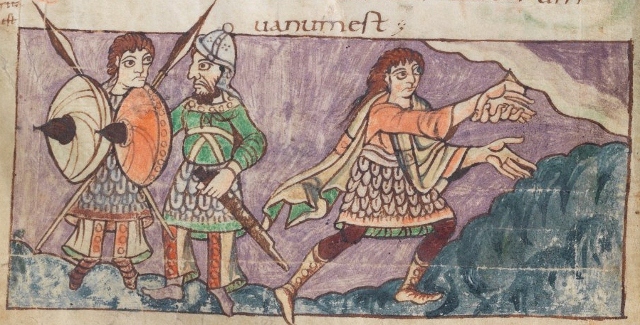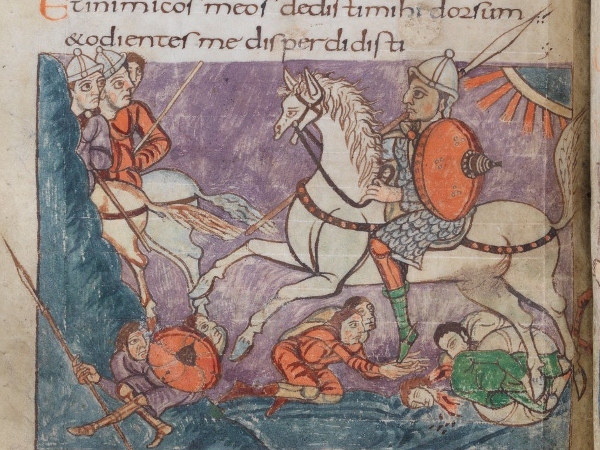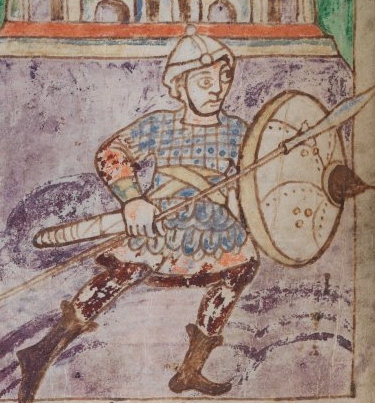| Author |
Message |
|
Raymond Deancona
|
 Posted: Sun 16 Sep, 2012 7:43 am Post subject: Carolingian arms and armor sources? Posted: Sun 16 Sep, 2012 7:43 am Post subject: Carolingian arms and armor sources? |
 |
|
|
Does anyone know of some good sources on Carolingian arms and armor (no Osprey books please), museum sites or other works? Thanks
|
|
  |
 |
Elling Polden

|
 Posted: Sun 16 Sep, 2012 8:03 am Post subject: Posted: Sun 16 Sep, 2012 8:03 am Post subject: |
 |
|
Here's an old thread on the subject:
http://www.myArmoury.com/talk/viewtopic.php?t=9561
"this [fight] looks curious, almost like a game. See, they are looking around them before they fall, to find a dry spot to fall on, or they are falling on their shields. Can you see blood on their cloths and weapons? No. This must be trickery."
-Reidar Sendeman, from King Sverre's Saga, 1201
|
|
    |
 |
Paul Hansen

|
 Posted: Sun 16 Sep, 2012 2:05 pm Post subject: Posted: Sun 16 Sep, 2012 2:05 pm Post subject: |
 |
|
Geibig wrote THE work on swords of the period.
Peirce´s book on Viking swords is also applicable as Viking sword = Carolingian sword (for most purposes).
|
|
  |
 |
|
Raymond Deancona
|
 Posted: Sun 16 Sep, 2012 3:33 pm Post subject: Posted: Sun 16 Sep, 2012 3:33 pm Post subject: |
 |
|
|
Hmmmm. I should have been more specific: readily available sources... I have the Viking Sword book, I was looking more for armor, tactics, clothing, lifestyle, etc. I would love to have access to the Geibig book!
|
|
  |
 |
|
Mart Shearer
|
 Posted: Sun 16 Sep, 2012 6:25 pm Post subject: Posted: Sun 16 Sep, 2012 6:25 pm Post subject: |
 |
|
FWIW, the Stuttgart Psalter is now online, so you don't have to keep relying on old b&w images.
The Stuttgart Psalter
WLB Cod.bibl.fol.23
http://digital.wlb-stuttgart.de/purl/bsz307047059
 Attachment: 196.75 KB Attachment: 196.75 KB

 Attachment: 249.79 KB Attachment: 249.79 KB

 Attachment: 148.05 KB Attachment: 148.05 KB

ferrum ferro acuitur et homo exacuit faciem amici sui
|
|
  |
 |
|
Mart Shearer
|
|
  |
 |
|
Craig Shackleton
|
 Posted: Mon 17 Sep, 2012 5:08 am Post subject: Posted: Mon 17 Sep, 2012 5:08 am Post subject: |
 |
|
I've got a busy day ahead, and I just spent too much time trying to track down a bunch of images, with no luck. Essentially, I wanted to point out that several of the Carolingian images show something that looks like scale or lamellar with either something wrapped over the stomach or a gap between an upper body defense and a skirt.
The archer on this page is a really good example:
http://digital.wlb-stuttgart.de/digitale-samm...a8afb8e910
If you look closely, the midsection is coloured the same as all of the metallic bits, and has little circles in it. My guess is that this part is depicting mail. It also looks to me like the little lines on the scales could be the lacing pattern we often see on lamellar.
I know that there is a whole can of worms about lamellar over mail, and the use of lamellar in western Europe.
However, this looks similar to a Byzantine image that I cannot currently locate that clearly shows this exact setup: Lamellar upper torso and skirt over mail with a significant gap in the lamellar at the abdomen.
I'll try to pull more of this together later, but someone else may have the images more readily to hand.
Caveat: I personally admit that I would love there to be evidence of western lamellar.
Ottawa Swordplay
|
|
   |
 |
|
Craig Shackleton
|
|
   |
 |
|
Mart Shearer
|
 Posted: Mon 17 Sep, 2012 6:30 am Post subject: Posted: Mon 17 Sep, 2012 6:30 am Post subject: |
 |
|

Where you see lacing in the Stuttgart Psalter, a see embossed ridges in scales. The Byzantine method of wearing torso armor and an apron over mail is much debated.
ferrum ferro acuitur et homo exacuit faciem amici sui
|
|
  |
 |
|
Craig Shackleton
|
 Posted: Mon 17 Sep, 2012 6:46 am Post subject: Posted: Mon 17 Sep, 2012 6:46 am Post subject: |
 |
|
I understand your interpretation of those images as ridged scales, and it's certainly possible.
My counter-argument is that the book shows images of scales both with and without the mark. All of the images with the mark show either some sort of partial or divided armour, or the waistline is obscured by a shield or something similar. Most of the images without the extra line show a tunic-like armour that goes to the knees, and none of them have the two part construction. Why?
My guess is that they are two different types of armour being depicted; lamellar and scale. My understanding is that scale is flexible enough to wear a knee-length armour (like a hauberk, although I don't believe that term applies outside of actual mail). Lamellar is more rigid, so having a more flexible armour at the waist makes sense, or likewise having lamellar that is only shirt length makes sense.
I am aware that the use of lamellar in conjunction with mail by Byzantines is hotly debated. That fact is one of the worms in the can I mentioned above!
I'll admit I'm not an expert in this particular area, and that I have a preference for the conclusion I am drawing, but I think it is a reasonable (though far from the only!) interpretation of the data.
I'd love to see more discussion on both sides from people who are more expert than me.
Thanks!
Ottawa Swordplay
|
|
   |
 |
|
|

